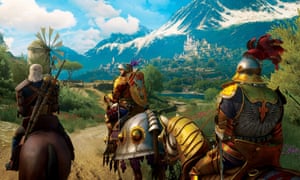The eight best advances in gaming during the last decade

In July 2004, Neil McIntosh, then head of blogging at the Guardian, posted a story on the newspaper’s growing website. “Welcome to Gamesblog, the videogames weblog from the Guardian,” he wrote. “Our aim here is to talk about games in an entertaining, adult way, and help you enjoy playing games on whatever gadget you own – PC, games console, handheld device or mobile phone. We hope you find things are a little different around here.”
Alongside Aleks Krotoski and Greg Howson, I was one of the writers brought on to contribute daily stories, news and personal opinions to this formative gaming blog – and while my compatriots eventually moved on, I hung around like a particularly tricky end-of-level boss, obsessively documenting the changing face of the industry. Back then, we thought the medium was about to enter a period of extraordinary change. We were right.
Today is my last day as the Guardian’s games editor. To mark this sad (for me) occasion, I have collected together what I think are the eight most wonderful things to have happened in video games over the years since I started. Of course, there have been countless technical innovations and improvements, from 4K visuals to AI and emergent storytelling, but it’s the changes in culture that have most affected me. Feel free to add your own memories.
1. The rise of open-world game design

Yes, there were open-world games before 2004, but the era of Grand Theft Auto IVand V, Assassin’s Creed, Far Cry, Saint’s Row, Skyrim and Witcher has seen the whole philosophy of level design evolve from highly prescriptive linear experiences to the provision of playful experimental spaces.
To this end, it’s worth reading Kate Gray’s feature on the genius of Legend of Zelda: Breath of the Wild as well as this piece by Robert Yang on spatial composition. But essentially, open-world games have encouraged players to be more curious, creative, adventurous and collaborative and that’s been amazing to watch.
2. The rise of the independent games community

Before the broadband era, it was difficult for small teams working on idiosyncratic projects to get their games seen by a large number of players. But gradually we had Xbox Live, the App Store, Steam and Itch.io, and a global audience for independent productions was created. At the same time, we started to see really interesting academic study of games, new courses like the NYU Game Center and the NFTS masters in game design, and the arrival of cheap and free tools like Unity, Game Maker and Twine. All of this combined to give small studios and lone designers the skills, tools and support to make subjective, strange and brilliant games, from the deeply personal to the deeply political.
The likes of The Passage, Papers Please, Gone Home, Spelunky, Dear Esther, Fez and Braid have changed the way we think about games, broadening the culture, vocabulary and spectrum of “interactive entertainment”. Vitally, none of this has happened at the expense of the mainstream games industry. We still get to play Wolfenstein, Call of Duty and Hitman. Nobody took those toys away.
3. The rise of the social experience
